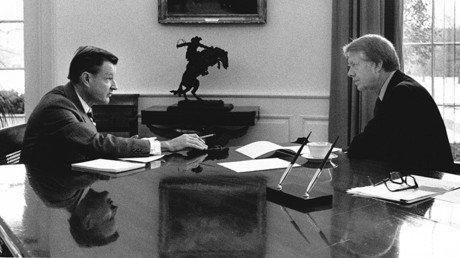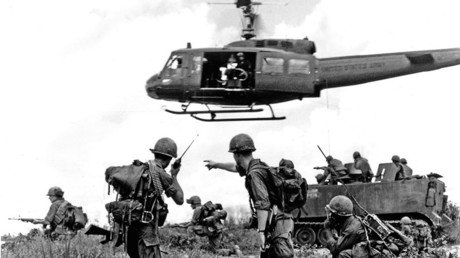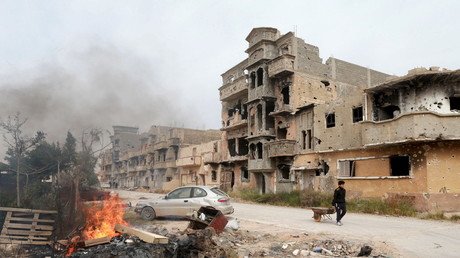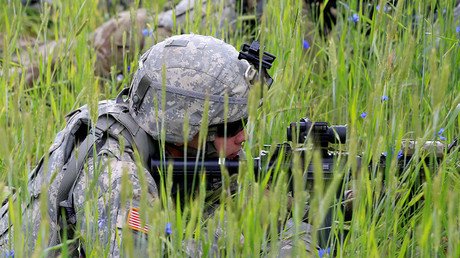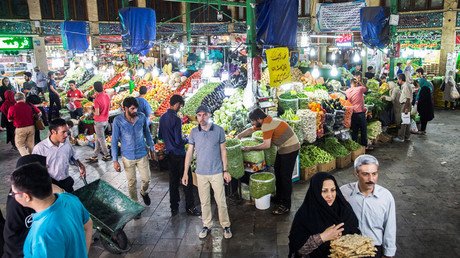1978: The year today’s world was made
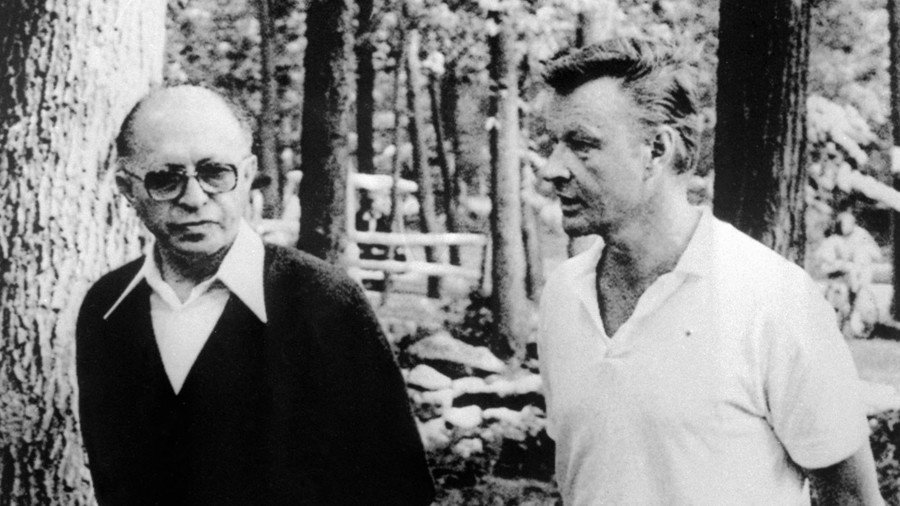
It was the year of Three Popes, the battle between a dove and a hawk in the US, protests against the Shah of Iran and a fateful error by the UK Labour prime minister. The events of 40 years ago have had a lasting global impact.
On January 1 1978, the world appeared to be a relatively stable place. What could broadly be described as moderate governments held sway in the West. Global economic conditions were improving following the 1973 oil price shock.
There were renewed hopes of Middle East peace.
By the start of 1981 however, the situation had changed dramatically. Détente between East and West was over. Neoliberalism had asserted itself in the US and UK. The economic situation had taken a turn for the worse, with mass unemployment returning to developed countries. The Middle East was again a region of much instability, with a full-scale war between Iraq and Iran.
1978 was the year when everything changed. In the US, a battle which had enormous geopolitical ramifications was raging within the administration between Secretary of State Cyrus Vance, a pro-détente dove, and President Jimmy Carter’s fiercely anti-Russian National Security Advisor Zbigniew Brzezinski. Carter zigzagged in his foreign policy, favoring Vance’s stance one moment and ‘Zbig’s’ the next, but over time the latter prevailed.
Afghanistan gave him his opportunity. Daoud Khan had ousted his cousin, King Mohammed Zahir Shah, as ruler of the country in 1973. But when in power, Daoud began to distance himself from his old leftist allies and pivot towards the West. His banning of the communist People’s Democratic Party of Afghanistan and dismissal of Soviet-trained army officers led, in April 1978, to the so-called ‘Saur Revolution,’ which brought the pro-Soviet Nur Muhammad Taraki to power and saw President Daoud and his wife and children murdered. The new communist-led government moved, too quickly it must be said, to introduce radical social reforms. This provoked resistance from conservative, Islamist forces, and Brzezinski saw his chance.
Extant from 1977, the Nationalities Working Group had been set up by ‘Zbig’ already. Its goal was to weaken the Soviet Union by stirring up ethnic and religious tensions.
As I noted in a previous article, it is a common misconception that the US only started to back fundamentalist rebels in Afghanistan after the Soviet tanks rolled into the country in December 1979. In fact, ‘Zbig’ had already persuaded Carter to agree to give secret aid to anti-government fighters a full five months before the Soviet intervention, with the move expressly designed to provoke a military response from the Kremlin.
Brzezinski was determined to give the Soviet Union its own Vietnam. With the aforesaid provocation, he achieved it.
In Britain, the Labour government of James Callaghan had by 1978 successfully reduced inflation through its prices and incomes policy, and with North Sea oil revenues steadily increasing the economic prospects looked very bright. “The outlook for Britain is better than at any time in the post-war years,” enthused Chase Manhattan Bank’s chief European economist, Geoffrey Maynard. Labour was ahead in the polls and at the TUC conference in September, the avuncular Callaghan was widely expected to call an early general election for October. But foolishly ‘Sunny Jim’ ruled that out, in what can only be described as the greatest miscalculation in the history of post-war British politics.
Continuing with ‘Phase IV’ of his anti-inflationary policies put Callaghan on a collision course with the trade unions and led to what the Conservative-supporting Sun newspaper dubbed “The Winter of Discontent.” Strikes, coupled with the harshest winter for 16 years, turned public opinion, particularly in the south-east of England, against the government, and paved the way for Margaret Thatcher’s triumphant entry into Downing Street in May 1979. Her victory, which would have seemed unlikely in September 1978, was a game-changer as it marked the end of the mixed-economy post-war consensus and ushered in a new era of privatization, de-regulation and de-industrialization.
1978 was a crucial year too in the development of the European Economic Community (EEC). The year was spent preparing for the introduction of the European Monetary System, which eventually led to the euro. Britain was the only EEC member that stayed out. The fears were that it would benefit the German economy at the expense of others in Europe, and so it proved.
There were also lasting consequences from the dramatic events in the Vatican. On August 6, Paul VI died. John Paul I was elected on August 26, but just 33 days later, on September 28, he was found dead in his bed, leading to some theorizing that he had been murdered.
John Paul II, the third Pope of 1978, and the first ever from Poland, was elected in October. The impact on global politics of the man who came to be regarded as one of the greatest Popes of all time cannot be overstated. His election emboldened opponents of communist rule in his native Poland, and his outspoken advocacy of human rights also undermined authoritarian/dictatorial right-wing governments in South America, including in Chile and Paraguay.
“The single fact of John Paul II’s election in 1978 changed everything. In Poland, everything began… Then the whole thing spread. He was in Chile and Pinochet was out. He was in Haiti and Duvalier was out. He was in the Philippines and Marcos was out,” said Joaquin Navarro-Valls, John Paul II’s press secretary.
A month before John Paul II became Pope, there was an important diplomatic breakthrough in relation to the Middle East. At Camp David, the US president’s country retreat, the leaders of Israel and Egypt, two countries which had been at war with each other only five years earlier, signed historic accords, which led to the Egypt-Israel peace treaty a year later. But although the treaty still holds today, it didn’t bring lasting peace to the Middle East. The Palestinian leadership, and much of the ‘Arab Street,’ regarded it as a betrayal. Anwar Sadat, the pipe-smoking, Edgar Wallace-reading Egyptian president who made the deal with Menachem Begin, was assassinated in 1981.
1978 was also the last full year of the Pahlavi dynasty in Iran. The Shah, a US client, had been on the throne since 1941, but opposition to his increasingly authoritarian rule had led to massive street protests. The CIA’s estimate in August that “Iran [is] not in a revolutionary or pre-revolutionary situation” proved to be wide of the mark.
Again, divisions in the US government proved critical. Vance accepted that the people in Iran desired change and urged Carter to establish direct contact with the exiled Ayatollah Khomeini. Brzezinski, ever the hardliner, urged the use of force.
In January 1979, the Shah, who was also stricken with cancer, left his country.
The exiled Ayatollah Khomeini returned in triumph and after a referendum, the Islamic Republic was proclaimed. Reacting to the situation in Iran, OPEC significantly raised the price of petroleum, triggering a new global recession. By 1980, inflation in the US had reached 14 percent. The economic downturn, the Iranian hostage crisis (which resulted in a botched rescue operation which Brzezinski had wanted and Vance opposed), and the fallout from the Soviet military intervention in Afghanistan in December 1979, paved the way for the defeat of Carter and the victory of Ronald Reagan in the 1980 US presidential election.
In the end Carter’s prevarications, like Callaghan’s in the UK, cost him dearly. The Soviet leadership also made mistakes at this time. When the man of peace Vance went to Moscow in March 1977, his plans for ‘deep cuts’ in arms levels were turned down.
“The rejection itself boosted Brzezinski,” note Jeremy Isaacs and Taylor Downing in their book ‘Cold War.’
Brzezinski’s strategy of backing militant Islamist militias in Afghanistan to “make the Soviets bleed” was continued after 1991 and has been deployed against allies of Russia in Libya and Syria. The world has become a much more dangerous place because of that policy and it has become a more unequal place too, since 1978.
In Britain 40 years ago, the gap between rich and poor had been reduced to its lowest in history. As I noted in the Guardian: “Never before had the share of income of the bottom 90 percent been so great and the share of the top 10 percent been so low.”
Inequality has risen sharply since. “Starting around 1980, income concentration in the top 1 percent skyrocketed, regaining by the mid-2000s the level of the late nineteenth and early twentieth century,” writes Robert Hunter Wade about the US, in his essay ‘Growth, Inequality and Poverty’ from Ravenhill‘s Global Political Economy.
In January, Oxfam revealed that the richest 1 percent bagged a staggering 82 percent of all the wealth created last year.
In the 1990s, Pope John Paul II, a key figure from 1978, saw the way things were heading under neoliberal globalization. In Latvia, he denounced the grave “social injustices” of “capitalist ideology” and acknowledged that Marxism contained a “kernel of truth.” Earlier, on a visit to Czechoslovakia, he had warned against replacing communism with consumerism and materialism. He also declared that“the ideology of the market” made solidarity between people “difficult at best.”
Whether we regard the changes brought about by what happened 40 years ago as positive, negative or a mixture of both, we cannot deny their significance. To a large extent, for better or for worse, we are still living in a world that the ‘reformers’ and ‘revolutionaries’ and a certain national security advisor of 1978 helped to fashion.
Follow Neil Clark on Twitter @NeilClark66
The statements, views and opinions expressed in this column are solely those of the author and do not necessarily represent those of RT.

